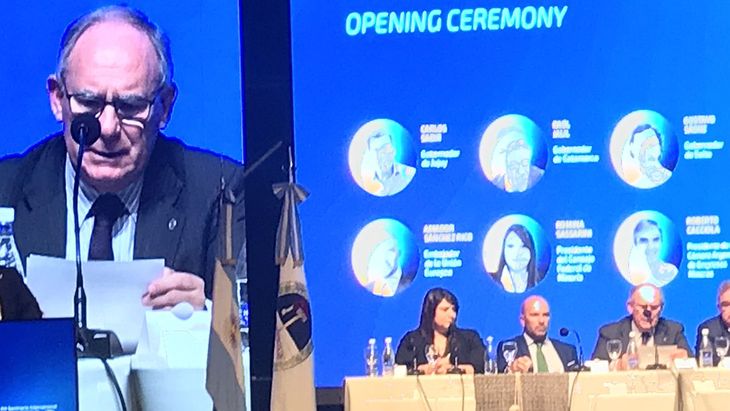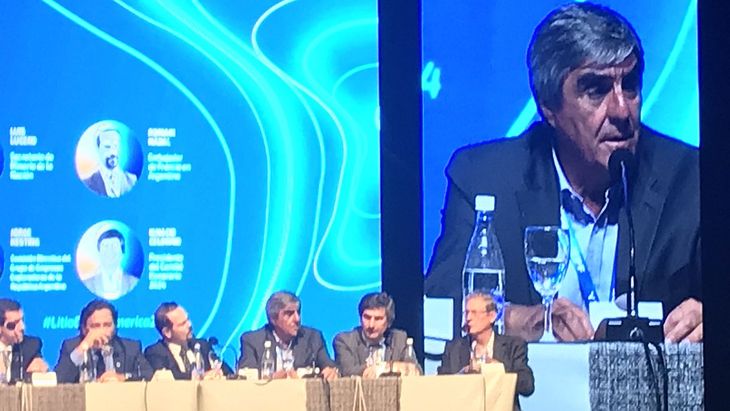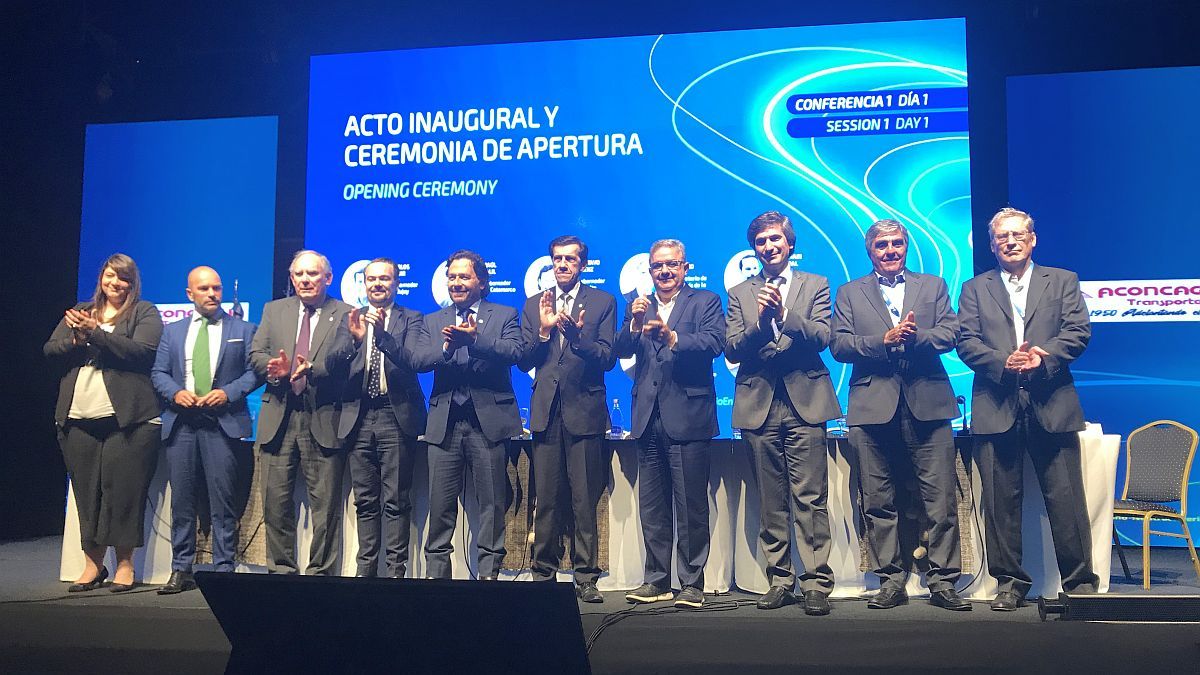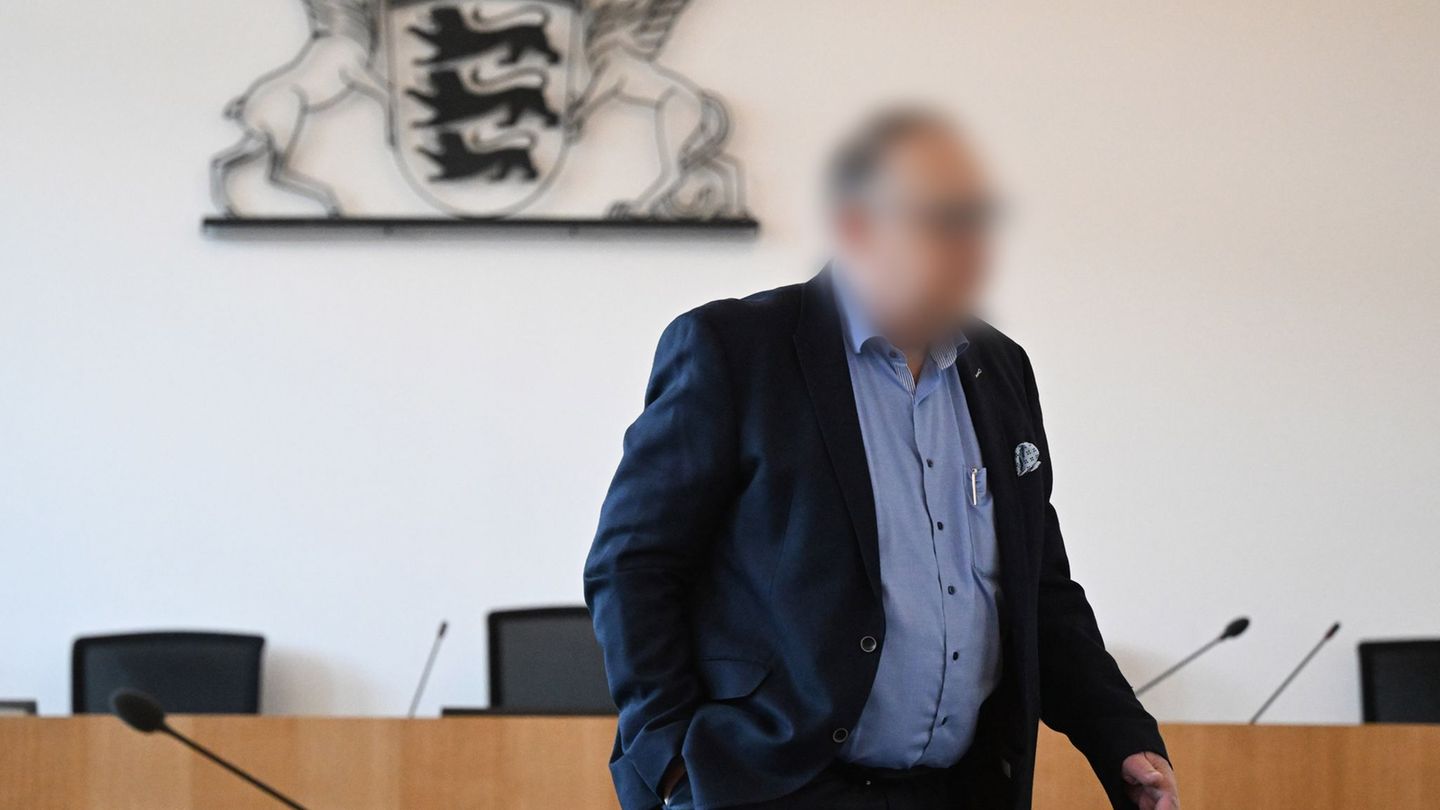image.png
The governors Gustavo Sáenz (Salta), Carlos Sadir (Jujuy) and Raúl Jalil (Catamarca).
The speeches at the opening of the Lithium Seminar in Jujuy 2024
The governor of Jujuy, Carlos Sadirassured that the NOA is a region in “full transformation process” and he said that with lithium “We do what we are building thinking about improving the quality of life of our people, but also to position us as protagonists not only in regional but also national and global development.”
“Lithium is a critical mineral for the transition towards clean energy, which is what the world is demanding today. But I also want to tell you that as governments, businessmen, suppliers, as well as those responsible and leaders on this issue, At the same time, we also occupy a fundamental role that is around the sustainability of the activity, which is around the commitment and obligation that we have to care for the environment, respect for the land and our communities.“, emphasized the president, and host of the meeting.
According to Sadir, the commitment to sustainable mining “is reflected in new jobs, in the improvement in the quality of life of our people” and that is why he considered it essential that he work on the Lithium Roundtable that he shares with Salta and Catamarca. “All together we have been achieving great changes, several historic advances for mining, but above all in our region,” he expressed.
The Salteño Gustavo Saenz admitted that along with the other mining provinces “We are aware of the richness of our resources and the potential they offer to transform our communities” and stressed that the “It is one of the engines that also drives innovation and sustainability in the future.”
“In Salta we have made significant progress in the modernization of the mining sector by implementing management systems that not only increase efficiency and transparency, but also guarantee environmental control of operations, an essential aspect for sustainable development, he emphasized.
Along these lines, Saénz highlighted the work of the Lithium Tablewhich managed to be ratified by law by the three provinces, and which promotes collaboration between the public and private sectors with local, national and global actors. “It is essential to build a framework that allows us to take advantage of the opportunities that this industry offers us,” he stated.
“In our province we have taken a proactive approach to sustainable mining by establishing clear regulations that not only protect our environment but also build trust among investors and our communities. We are committed to creating an ecosystem where all actors benefit equitably,” He stated when remembering the importance of inclusion in this industry.
“We firmly believe that mining should be a path towards the empowerment of all sectors of society. By encouraging the participation of women and men in this industry we not only guarantee greater equity but also ensure that new ideas and approaches are incorporated that will enrich the sector,” he said.
Finally, the governor of Salta referred to the impulse that the RIGI will give to mining investments. “It allows all those who want to invest in our province to have tax, customs, and exchange benefits. And the truth is that for those who want to invest in Argentina, today is the opportunity to do so”he stressed. “In each of our provinces we have guaranteed and we will continue to guarantee these types of clear rules because it is the only way to generate trust and for that they have many investors from different parts of the world,” he stressed.
In a strong message in defense of local suppliers, Sáen also warned: “First our people, our suppliers who have been trained both to generate work and to provide the necessary services. And we are going to defend, as we defend the legal security of those who invest, what corresponds to us and what the law establishes. First the “jujeños, salteños and catamarqueños, and then the other suppliers who want to come to accompany when we do not have enough capacity to do so”he concluded.
The governor Raul Jalil revealed that in Catamarca there are 2,400 direct mining employees and 6,000 indirect employees registered. “Catamarca is improving the quality of life of the communities. We have economic control, social control and we are working every day to achieve a better relationship between the three provinces and also between suppliers, unions and companies. The challenge we had when we started the Lithium Roundtable with Gerardo (Morales) in the previous administration was to have common policies. Now, we have the RIGI, and after trips to Berlin and London we have noticed greater interest in the search for investments,” Jalil highlighted.
According to the president, thanks to the incentive regime “a greater possibility of investments and political security is being achieved than what national regulations mean.”
Luis Lucero Litio Jujuy.jpg

Luis Lucero, Secretary of Mining of the Nation.
Luis Lucero It coincided with the “growing interest of the world” in Argentine mining projects. “This gives us pride because it is a clear sign that the world sees in our country and our region a promising future in terms of mineral resources and their role in the economies of tomorrow,” he said, although he stressed that “we must remind ourselves that this path is just beginning.”
Argentina has vast resources, but we still do not know our full potential. There are important opportunities that depend on greater investment in exploration, since only through sustained effort in this area will we be able to identify all the resources we really have within our border. It is essential that we deepen this knowledge to share Argentine expectations and realities,” he stated before a packed auditorium.
“Whether it’s lithium, copper or any other key resource, we must be prepared to work like this for the next 20 or 30 years, ensuring that we do it with maximum efficiency and, above all, with transparency,” proposed the Secretary of Mining.
“The sustainability of our projects, both in economic and environmental terms, will be fundamental to ensure that we remain an attractive destination for investment in the long term,” he added.
The head of the Federal Mining Council (COFEMIN), Romina Sassariniadvocated having an “absolutely federal view” of the provinces, necessary for the search for consensus. “We need dialogue, but also give debate. We are proposing to work on lithium issues with an absolutely federal perspective. This critical mineral for the energy transition is here to stay. The conjunctural, temporary issues that lithium may be going through are just that,” He highlighted the price drop from 80,000 to just over 12,000 in almost a year.
“This lithium that is an engine of development for our provinces, this lithium that is a great dynamizer of regional economies, which allows the provinces to be able to train human resources, to be able to generate qualified labor, to have salaries above the normal measurement , jobs that have zero informality, but also a great development of the supplier chain, which is just around the corner,” said the Minister of Energy and Mining of Salta.
“CONFEMIN will always be accompanying the dynamics of the activity, promoting mining in all Argentine provinces, but not at any price. The activity has to be framed in the pillars of sustainability,” the official stated.
The president of the Argentine Chamber of Mining Companies (CAEM), Roberto Cacciolarecalled that with the three lithium projects underway, about 32,000 tons of lithium carbonate are produced per year, but revealed that when all the projects that are currently under construction are launched by 2036, production will rise to 235,000 tons a year. annuals, which means a growth of more than seven times.
CAEM Roberto Caccio Lithium Jujuy.jpg

Roberto Cacciola, president of the Argentine Chamber of Mining Companies (CAEM).
In this framework, Cacciola highlighted another important merit of lithium, which he said must be taken advantage of. “Lithium has changed the vision of Argentine society on mining. The installation of lithium and its direct link with the generation of clean energy and the possibility of, together with copper, being strategic minerals for the control of emissions, has meant that today in Argentina more than 60% of the population is in favor of mining activity,” stressed the business leader, with recent data from Poliarquía. “That forces us to have very strong responsibilities,” he challenged, and asked all actors to “manage anxieties.”
“Why? Because in some way certain expectations are generated, some of which can be achieved and others are more difficult, and in the middle an unexpected situation occurs that has to do with an eventual and circumstantial drop in the price. It is also linked to the possibility of managing the crisis that growth brings. It is a good crisis, but in any case it remains one, and in that sense we from the Chamber believe it is essential at this time to talk about priorities and not privileges,” he said.
The head of CAEM first proposed thinking about the development of the communities, the provinces, and also the Nation, because “fortunately with this important growth in the image of mining at the national level, provinces that have a lot of interest in participating in the possibility of making associations. But in addition to taking care of the social license obtained, he also advised improving job training. “We have a very strong challenge in all areas, the operators, the suppliers, in terms of training in every sense. And today the immediate needs are linked to people who are less prepared to face work challenges,” he stressed.
Source: Ambito
David William is a talented author who has made a name for himself in the world of writing. He is a professional author who writes on a wide range of topics, from general interest to opinion news. David is currently working as a writer at 24 hours worlds where he brings his unique perspective and in-depth research to his articles, making them both informative and engaging.




